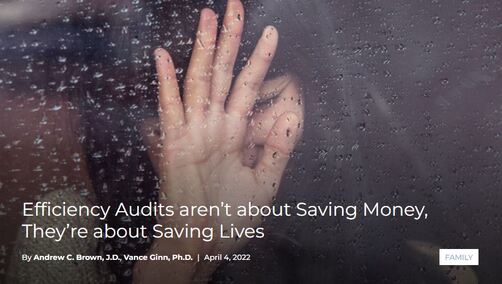 When Uvea was 9, Oregon’s foster care agency couldn’t find a placement in-state, so it sent her to Montana—to a poorly supervised facility where she was drugged, physically restrained and verbally abused by facility staff. “Can I say the two words she called me?” Uvea asked a lawmaker during a later legislative hearing. “They made me feel very uncomfortable. She called me a pervert and a prostitute.” Remember, she was 9 at the time. Untold damage was done to the young girl—but one thing came of it that will benefit all Oregon foster children. Her story sparked an effort to reform Oregon’s child welfare programs, beginning with an efficiency audit. Following the audit, every single child placed out-of-state was brought back to Oregon without increasing the number of foster homes, simply because the state learned how to use its resources more efficiently. And that Montana facility has been shut down. Today, Uvea is 11 years old and living in what she recently told state lawmakers is “the best foster home” she’s ever been in. Too many government programs aren’t achieving their intended purpose. This doesn’t serve the intended recipients—like Uvea—or the taxpayers well. Next session, the Texas Legislature can utilize effective and powerful independent efficiency audits to determine how programs, including Child Protective Services, are performing, where waste can be cut, and what outcomes can be improved. While traditional financial audits can uncover evidence of malfeasance, they only look at the money trail. An efficiency audit goes even further, investigating whether funds are being used for their intended purpose and whether they’re being spent efficiently toward desired outcomes. Bringing in an independent, private sector auditor, rather than the state’s auditor, prevents a potential collusive situation between government entities and provides a fresh perspective that can identify innovative solutions, counteracting the myopic tendencies of government bureaucracy. Last session, the Texas Public Policy Foundation identified the need for independent efficiency audits of the Temporary Assistance for Needy Families (TANF) program and the Department of Family and Protective Services (DFPS), which contains CPS. Both TANF and DFPS have had problems achieving their intended goals. DFPS is a major recipient of TANF dollars in Texas, which is intended to help strengthen families and promote self-sufficiency. DFPS is also responsible for administering the state’s foster care system. In response to the ongoing foster care crisis, the Legislature increased appropriations to the agency. Our internal analysis of corresponding DFPS expenditures raised significant concerns regarding the appropriateness and efficacy of those dollars spent. Specifically, our analysis found that a significant portion of these funds were not getting to the families most in need. Rather, one third of the roughly $1 billion annually in TANF funds are allocated to DFPS, yet half of that third goes to administrative and overhead expenses—things like staff salaries and IT services. That’s money that could have otherwise been used towards its stated intent to help needy Texans. Why was this happening? TANF is primarily funded through a block grant from the federal government, with the rest funded by the state. States have flexibility in how they administer and distribute that funding. While this flexibility can be helpful, DFPS used TANF dollars to fill budget gaps rather than meet its goals. This misuse of TANF dollars by the department revealed a need to investigate whether other agencies were engaging in similar behavior. When we advocated for the use of an independent efficiency audit, we specifically sought to investigate how well both TANF and DFPS were doing at achieving the intended goals of helping Texas families move from dependence to self-sufficiency. Under the new laws passed in 2021 (HB 1516 and HB 2374), that question must be answered every four years before the start of a legislative session. Doing so allows legislators to critique agency appropriations requests more knowledgeably and to ensure taxpayer resources are generating intended outcomes. Because these audits must stay within the bounds of current resources available to each department or agency, taxpayers are assured these efforts will not be used to grow government, but rather evaluate how government could be improved, reformed, or cut. Identifying opportunities to consolidate efforts across separate agencies for example, or when a governmental function might be performed more successfully by a community provider, can provide legislators and the public with solutions that will lead to better services to beneficiaries at lower costs to taxpayers. Oregon, Wyoming, and Kansas are states that have made great strides because of their respective efficiency audits. Louisiana, likewise, recently did an internal efficiency audit of TANF, which the legislative auditor found much needed improvement to achieve the intended goals. Texas Legislators should bring efficiency audits to every aspect of government to generate better outcomes and save taxpayer resources. Little children like Uvea are counting on them. https://www.texaspolicy.com/efficiency-audits-arent-about-saving-money-theyre-about-saving-lives/ Comments are closed.
|
Vance Ginn, Ph.D.
|

 RSS Feed
RSS Feed